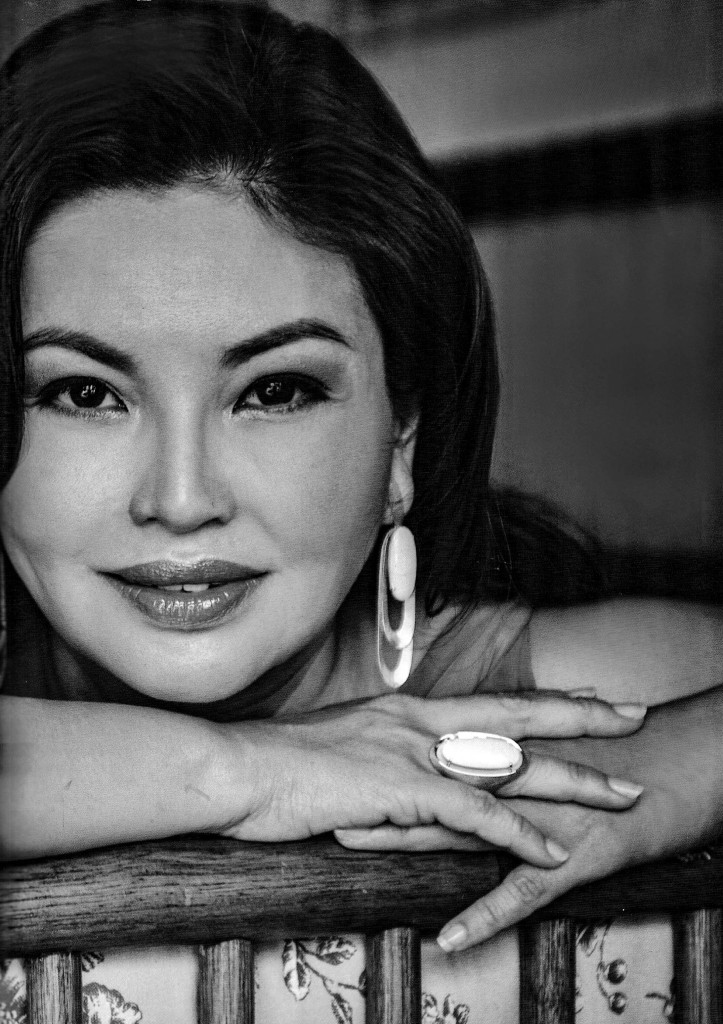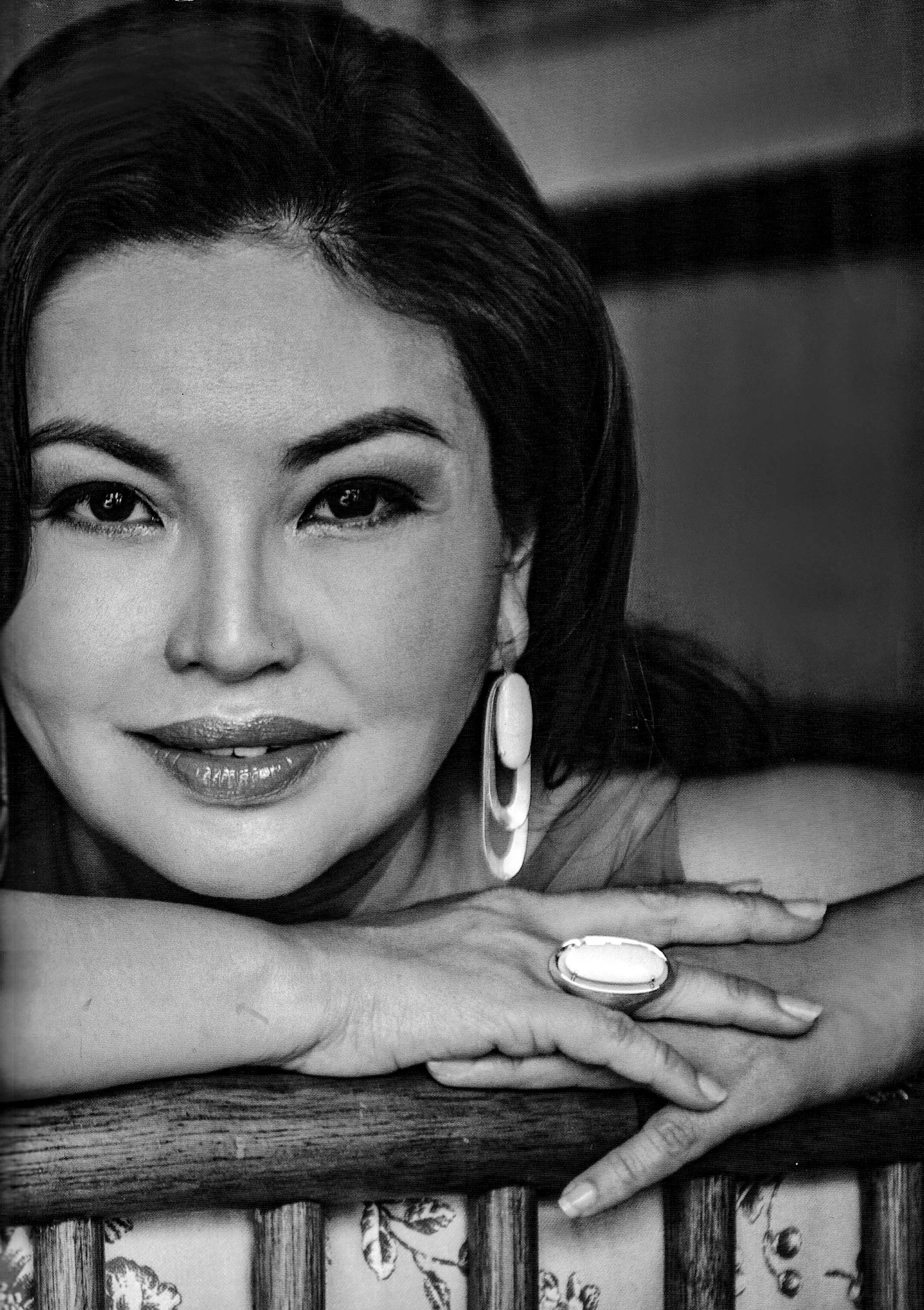The late Sari Yap was a pioneer and trailblazer whose name will always be associated with the early days of glossies in the Philippines. In this article previously published in PeopleAsia‘s August-September 2009 issue, we remember the former “Women of Style & Substance” awardee and how she founded and built her publishing empire, One Mega Group.

By Denise Roco
Filipinos once could not pick up a glossy magazine unless it was imported, but all that changed and all it took was a lovely lady with one dream and the tenacity to transform something from nothing. For the high-spirited beauty that is Sarita “Sari” Yap, the One Mega Group is far from her “alpha and omega.”
Whereas most of the women in this feature chose long flowing dresses or smart-looking frocks, Sari opted for something bold and daring for the first layout of the pictorial, a short spunky Religioso cocktail dress in magenta, green and lavender, which was reflective of her personality.
The title attached to her name is president and chief executive officer of the One Mega Group, but nowhere in her company’s website is the essential credit of Sari being the founder. “I started from scratch, from a thesis and now it has 11 titles (Mega, Lifestyle Asia, Lifestyle Asia Travel, Meg, My Home, BluPrint, Condo Living, S Magazine, Celebrity Living, Appetite and Hair). We also do nationwide distribution on our own, we have the logistics,” states Sari as a matter-of-fact. She continues, “everything before had to be done abroad, color separation had to be done in Hong Kong, everything! The technology had to be invented here in the country.”
This University of the Philippines cum laude graduate of Broadcast Communication was also a KBP (Kapisanan ng mga Brodkaster sa Pilipinas) scholarship grantee who pursued a master’s degree in Media Management at the University of Navarre, Spain. Receiving a scholastic accolade of sobresaliente cum laude for her masteral thesis, “Entrepreneurship in Mass Media,” Sari returned to the country and pioneered in the glossy magazine industry. With her desire for knowledge still not sated, Sari took a professional publishing course at Stanford University.
Having been editor-in-chief of two titles, fashion magazine Mega (from 1992-2003) and society magazine Lifestyle Asia (from 2003 – 2007), their oldest running title at 22 years old, Sari shares her thoughts on the traits of a good editor, which, apart from intelligence and high emotional quotient, is “the capacity not to rely on personal taste. (A good editor is) able to distill the essence of the market and think of only one person that you have to please and (that) everything that goes into the magazine is meant to please the essence of (the) entire readership. I think that’s the best editor because a lot of people don’t understand that.”
In a confident pose, Sari proudly says of the Mega Publishing Group, “I made it into what I wanted it to be. I don’t have to work for something. I created something I wanted to work for. I created my own corporate culture (no Saturday work). We go to work at 9, not 7 or 8… I believe that for you to be happy in your work, it has to be the perfect type of work, that will bring out what’s in you.”
Responding to what she would like to change in the industry, she says at first with a giggle, “I wish ad rates were higher. Know why? The cost of producing a magazine in the Philippines is the same as producing one in Hong Kong and yet ad rates are three times more in Hong Kong. It’s a much more profitable business than here because the country really can’t afford. I see the magazines as products. It was important to make our magazines make money and not just make one (title after another). (And) oftentimes in this business, people can be bitchy more than in other normal professions, shall we say. It would be nice if that changed, if people were friendlier or more accepting of each other. You always hear of somebody saying, ‘She’s like this, she’s like that. This person’s gay!’ What does it matter? We don’t really know what people think or why people do things. It would be nice if people just accepted each other without comment because people get hurt.”
Unafraid, Sari adds with clear acceptance of self, “I’m not as strong as I used to be. Don’t you think more often than not, we give ourselves a hard time? I’ve learned to give myself not such a hard time. I think that the happiest among us siblings is my sister who stopped working soon after she finished college. She has two kids. She likes cleaning the house and doing the laundry and who am I to say she’s not successful? The big thing is she feels successful. Not that I’m complaining, but I feel that why did I have all these plans and ambitions in me and now I have to do it in order to feel that I’ve done it when she’s already achieved hers years ago. She’s been married for I think 18 years already and from that very beginning she was happy. So that’s success!”
After the interview, Sari closes her eyes as the makeup artist and hairstylist take over. Her silence overshadows many background noises, as she awaits the sanctuary of her condo, seeing fishes glide in the aquarium of her living room before watching a little TV at the end of the day.
This article first appeared on PeopleAsia’s Women of Style and Substance 2009 issue.





